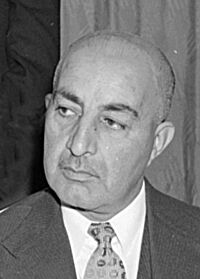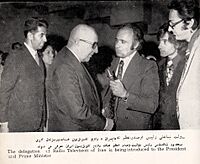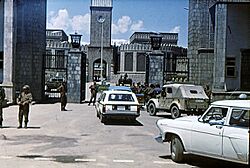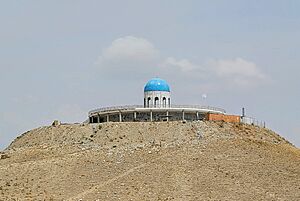Mohammad Daoud Khan facts for kids
Quick facts for kids
Mohammad Daoud Khan
|
|
|---|---|
|
محمد داود خان
|
|

Daoud in 1975
|
|
| 1st President of Afghanistan | |
| In office 17 July 1973 – 28 April 1978 |
|
| Vice President | Sayyid Abdullah |
| Preceded by | Mohammad Zahir Shah (as King) |
| Succeeded by |
|
| Head of House of Barakazai | |
| In office 17 July 1973 – 28 April 1978 |
|
| Preceded by | Mohammad Zahir Shah (as King) |
| Succeeded by | Sardar Prof. Abdul Khaliq Khan Telai |
| Prime Minister of Afghanistan | |
| In office 7 September 1953 – 10 March 1963 |
|
| Monarch | Mohammad Zahir Shah |
| Preceded by | Shah Mahmud Khan |
| Succeeded by | Mohammad Yusuf |
| Personal details | |
| Born | 18 July 1909 Kabul, Emirate of Afghanistan |
| Died | 28 April 1978 (aged 68) Kabul, Democratic Republic of Afghanistan |
| Cause of death | Execution |
| Resting place | near Taj Beg hill |
| Political party | National Revolutionary Party |
| Spouses | Princess Zamina Begum (cousin), sister of King Zahir Shah |
| Children | 7 |
| Military service | |
| Allegiance | (1939–1973) (1973–1978) |
| Years of service | 1939–1978 |
| Rank | General |
| Battles/wars |
|
Mohammad Daoud Khan (Pashto: محمد داود خان; born 18 July 1909 – died 28 April 1978) was an important Afghan leader. He served as the Prime Minister from 1953 to 1963. Later, he led a coup that ended the monarchy. He then became the first President of the new Republic of Afghanistan in 1973. He was in power until he was killed in another coup in 1978, known as the Saur Revolution.
Daoud Khan was part of the Afghan royal family. He started his career as a governor and then a military officer. His cousin, King Mohammad Zahir Shah, made him Prime Minister. He served for ten years. He wanted to change Afghanistan into a one-party system. When the King disagreed, Daoud Khan led a peaceful coup. He became the first President of Afghanistan. He created a one-party system under his National Revolutionary Party.
He was known for his strong leadership and for bringing in new educational and social changes. He tried to remove communists from the government. Some of his policies also upset religious groups and those who wanted more political parties. His social and economic changes were successful. However, his foreign policy caused problems with neighboring countries. In 1978, he was removed from power and killed during the 1978 Afghan coup d'état. This coup was led by the Afghan military and the communist People's Democratic Party of Afghanistan (PDPA). His body was found 30 years later. It was identified by a small golden Quran he always carried. He was given a state funeral.
Contents
Early Life and Career
Mohammad Daoud Khan was born in Kabul, Emirate of Afghanistan. He was the oldest son of Prince Mohammad Aziz Khan. His father was killed in 1933 while working as Afghanistan's Ambassador to Germany. Daoud and his brother Naim Khan were then raised by their uncle, Mohammad Hashim Khan. Daoud was a very good student of politics.
He studied in France. He worked as a senior administrator in the Kingdom of Afghanistan. He was Governor of the Eastern Province from 1934–35 and again from 1938–39. He also served as Governor of Kandahar Province from 1935 to 1938.
In 1939, Daoud Khan became Commander of the Central Forces. He led Afghan forces during some tribal revolts. From 1946 to 1948, he was the Defense Minister. Then he was Interior Minister from 1949 to 1951. In 1948, he was also Afghanistan's Ambassador to France.
In 1951, he became a General. He commanded the Central Corps of the Afghan Armed Forces in Kabul until 1953.
Royal Prime Minister
In September 1953, Daoud Khan became prime minister. He took over from his uncle, Shah Mahmud Khan. His ten years as Prime Minister were important for several reasons. He turned Afghanistan's foreign policy more towards the Soviet Union. He also completed the Helmand Valley project. This project greatly improved life in southwestern Afghanistan. He also took steps to give women more freedom and educational chances. This allowed women to have a greater public presence.
When Pakistan became an independent country in 1947, Prime Minister Daoud Khan did not accept the Durand Line. This line was the border between Afghanistan and Pakistan. He wanted to unite the Pakistani Pashtun people with Afghanistan. This idea worried other groups in Afghanistan, like the Hazara, Tajiks, and Uzbeks. They thought he wanted to give more power to the Pashtuns.
In 1960, Khan sent troops into Pakistan's Bajaur Agency. He wanted to push the "Pashtunistan" issue. But Afghan forces were defeated by local tribal groups. In 1961, he tried again with a larger army. However, Pakistan used F-86 Sabres jets. These jets caused many losses for the Afghan army.
In 1961, Pakistan closed its borders with Afghanistan because of Daoud Khan's policies. This caused an economic crisis in Afghanistan. It also made Afghanistan rely more on the USSR. The USSR became Afghanistan's main trading partner. The USSR sent military equipment to Afghanistan at a very low price. Daoud Khan also helped Afghanistan become a founding member of the Non-Aligned Movement.
People were unhappy with Daoud's strong rule and close ties with the USSR. The economic problems also made things worse. He was asked to resign. Instead, he asked King Zahir Shah to approve a new "one-party constitution." This would have given him even more power. When the King refused, Daoud Khan resigned in March 1963. The border with Pakistan was reopened in May. He was replaced by Mohammad Yusuf.
In 1964, King Zahir Shah introduced a new constitution. This constitution prevented members of the royal family from being ministers. Daoud Khan had already stepped down by then.
President of the Republic
Daoud Khan was not happy with King Zahir Shah's system of government. He felt there was not enough progress. He planned a rebellion for over a year. On 17 July 1973, he took power from the King. The coup was peaceful. Many army officers supported him, and there was no resistance. For the first time in Afghan history, he did not become King. Instead, he created a republic and became its President. Some called him the "Red Prince" because pro-communist officers helped him.
The King's constitution, which had a parliament and separate powers, was replaced. A new, mostly appointed, loya jirga (grand assembly) took its place. The parliament was closed down.
Even though he was close to the Soviet Union as Prime Minister, Khan continued Afghanistan's policy of non-alignment. This meant Afghanistan did not pick sides in the Cold War. He also did not make big pro-Soviet changes to the economy.
In his new government, many ministers were new to politics. Some were members or supporters of the PDPA. But over time, Khan reduced their influence.
In October 1973, a former Prime Minister, Mohammad Hashim Maiwandwal, was arrested for planning a coup. He died in prison before his trial. This happened when communists controlled the Interior Ministry. Many believed he was tortured to death by them.
In 1974, Daoud Khan signed agreements to make the Afghan military much stronger. There were worries that Afghanistan's army was not as modern as those in Iran and Pakistan.
In 1975, his government took control of all banks in Afghanistan. This included Da Afghanistan Bank, the country's central bank.
Khan wanted Afghanistan to rely less on the Soviet Union. He tried to create a new foreign policy. In 1975, he visited countries like Egypt, Turkey, Saudi Arabia, and Iran. These countries were not close to the Soviet Union. He asked them for help. He also visited India. He did not restart the "Pashtunistan" issue. Relations with Pakistan improved with help from the US and the Shah of Iran. These actions worried the Soviets.
New Constitution and Policies
In 1977, Daoud Khan created his own political party, the National Revolutionary Party. This party became the only legal political group. In January 1977, a loya jirga approved a new constitution. This constitution created a presidential one-party system of government.
He also started to make his socialist policies less strict. The 1977 constitution combined nationalism with earlier socialist and Islamic ideas. In 1978, there was a disagreement with the PDPA. He tried to distance himself from the communists in his government. He was concerned about Afghanistan's growing reliance on the Soviet Union. These actions were criticized by Moscow. The Soviets worried that Afghanistan might become closer to the West, especially the United States.
During his later years, his removal of communists from his government caused problems with them. His desire for one-person rule also created conflicts with liberals who had been in power before. At the same time, his actions against religious conservatives made them and their supporters angry.
Relations with Pakistan
Just like when he was Prime Minister, Daoud Khan again brought up the issue of Pashtunistan. This led to tense relations with Pakistan.
Daoud's government also trained groups that acted against Pakistan. This caused Pakistan to also interfere across the border. By 1975, Pakistani Prime Minister Zulfiqar Ali Bhutto began a proxy war in Afghanistan.
Trade and travel agreements with Pakistan were badly affected. In 1975, Pakistan blamed Afghanistan for unrest and a bombing at Islamabad airport. At the same time, Afghanistan faced short uprisings. Afghanistan blamed these on Pakistan. Both countries sent more troops to their border.
However, by early 1976, relations between the two countries got better. The leaders of Pakistan and Afghanistan exchanged visits. Daoud Khan was also worried about the growing power of communists in his government. So, he started to improve relations with Pakistan and Iran. Pakistan also sent aid to Afghanistan to help with an earthquake and floods. This helped improve Afghan public opinion about Pakistan.
By late 1976, relations with Pakistan had greatly improved. Daoud Khan and Ali Bhutto even reached a possible agreement on the Pashtunistan problem.
Relations with the Soviet Union
Daoud Khan met Leonid Brezhnev in Moscow in April 1977. He wanted to talk about the Soviet Union's increasing actions in Afghanistan. He specifically discussed Soviet attempts to unite the two Afghan communist parties, Parcham and Khalq. Brezhnev said Afghanistan's non-alignment was important to the USSR. He also warned Daoud about experts from NATO countries in northern Afghanistan. Daoud clearly replied: "We will never allow you to tell us how to run our country. How and where we use foreign experts is only for Afghanistan to decide. Afghanistan will remain poor, if needed, but free in its actions and choices."
After returning to Afghanistan, he planned to reduce ties with the Soviet Union. Instead, he wanted closer connections with Western countries, Saudi Arabia, and Iran. Afghanistan signed a military agreement with Egypt. By 1977, the Afghan military and police were being trained by Egyptian Armed Forces. This angered the Soviet Union. Egypt had also distanced itself from the Soviet Union in 1974.
Overthrow and Death
After a communist leader named Mir Akbar Khyber was killed, his funeral on 19 April 1978 became a gathering point for Afghan communists. Many people came to hear speeches from PDPA leaders.
Daoud Khan was surprised by this show of communist unity. He ordered the arrest of the PDPA leaders. But he acted too slowly. It took him a week to arrest Taraki. Karmal escaped to the USSR, and Amin was only placed under house arrest. Khan thought Karmal's group was the main threat. But Amin's group had many supporters in the military. Amin sent orders for the coup from his home, using his family as messengers.
The army was put on alert on 26 April. On 27 April 1978, a coup d'état began. Troops moved at the military base near Kabul International Airport. Over the next 24 hours, rebels fought against units loyal to Daoud Khan in and around the capital.
Khan and most of his family were killed during the coup. This happened in the Arg, the former royal palace, on 28 April 1978. There was heavy fighting and many deaths. The new military leaders announced that Khan had been killed because he refused to support the new government.
Body and State Funeral
On 28 June 2008, Daoud Khan's body and those of his family were found. They were in two mass graves outside Pul-e-Charkhi prison in Kabul. Initial reports said 16 bodies were in one grave and 12 in the other. On 4 December 2008, the Afghan Health Ministry announced that Daoud's body had been identified. They used his teeth and a small golden Quran found near his body. This Quran was a gift from the King of Saudi Arabia.
On 17 March 2009, General Daoud was given a state funeral. His only surviving child, Dorkhanai, attended the funeral.
Daoud and the following family members were killed on 28 April 1978 and are buried near Darul Aman Palace, Kabul:
- Brother: Sardar Muhammad Naim Khan (age 68)
- Daughter: Bibi Zarmina Naim Ghazi
- Wife: Bibi Zainab Daoud (age 61)
- Sister: Bibi Aisha Daoud (age 58)
- Son-in-law: Sardar Niezamudeen Ghazi (age 44)
- Daughter: Bibi Safora Abdulaziz Ghazi (age 13)
- Son: Sardar Muhammad Umar Daoud (age 44)
- Daughter: Bibi Hila Umar (age 17)
- Daughter: Bibi Ghizal Umar (age 14)
- Daughter: Bibi Shinkay Daoud (age 38)
- Son: Sardar Wais Daoud (age 31)
- Wife: Bibi Shaima Asefi Daoud (age 32)
- Mother: Bibi Belqis Asefi (age 58)
- Son: Sardar Ares Daoud (age 5)
- Son: Sardar Waygal Wais Daoud (age 2)
- Wife: Bibi Shaima Asefi Daoud (age 32)
- Son: Sardar Khalid Daoud (age 31)
- Daughter: Bibi Zarlasht Daoud (age 25)
Personal Life
In September 1934, Daoud Khan married his cousin, Princess Zamina Begum. She was the sister of King Zahir. They had four sons and four daughters:
- 1. Zarlasht Daoud Khan (1953 – killed 1978)
- 2. Khalid Daoud Khan (1947 – killed 1978). He had one son:
- Tariq Daoud Khan
- 3. Wais Daoud Khan (1947 – killed 1978). He had four children:
- Turan Daoud Khan (born 1972)
- Ares Daoud Khan (1973 – killed 1978)
- Waygal Daoud Khan (1976 – killed 1978)
- Zahra Khanum (born 1970)
- 4. Muhammad Umar Daoud Khan (1934 – killed 1978). He had two daughters:
- Hila Khanum (1961 – killed 1978)
- Ghazala Khanum (1964 – killed 1978)
- 5. Dorkhanai Begum
- 6. Shinkay Begum (1940 – killed 1978). She had two daughters:
- Ariane Heila Khanum Ghazi (born 1961)
- Hawa Khanum Ghazi (born 1963)
- 7. Torpekay Begum. She had three children:
- Shah Mahmud Khan Ghazi
- Daud Khan Ghazi
- Zahra Khanum Ghazi
 | Janet Taylor Pickett |
 | Synthia Saint James |
 | Howardena Pindell |
 | Faith Ringgold |




